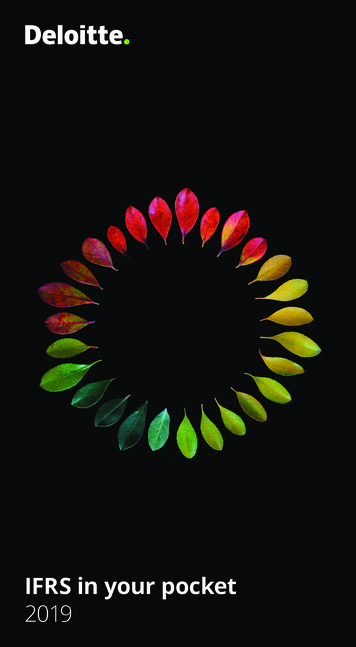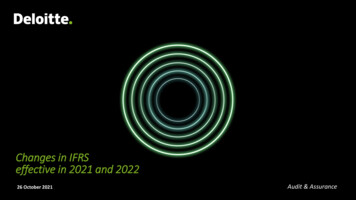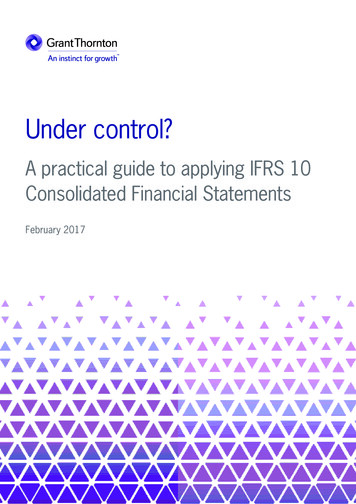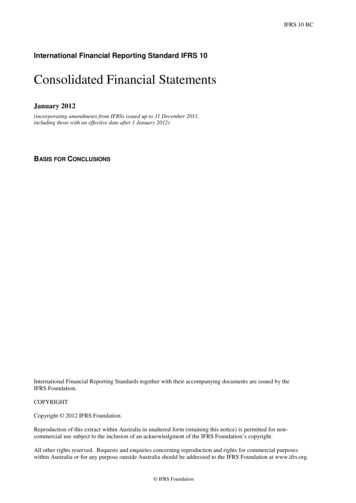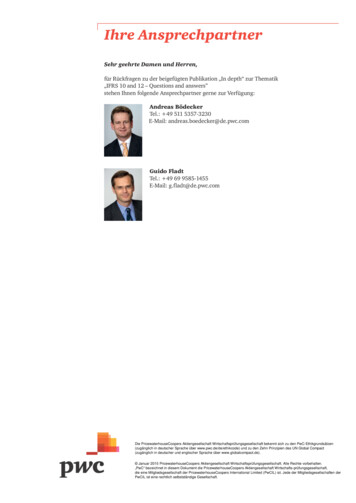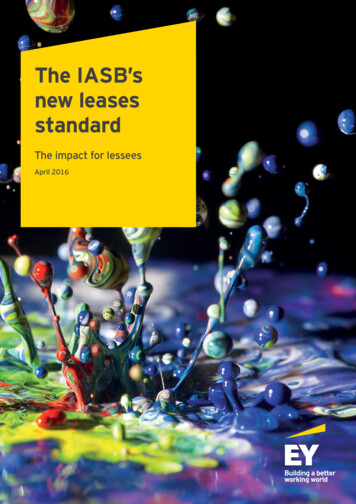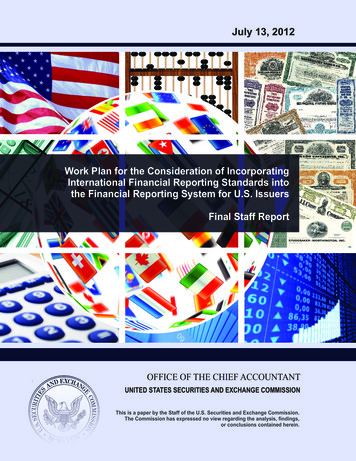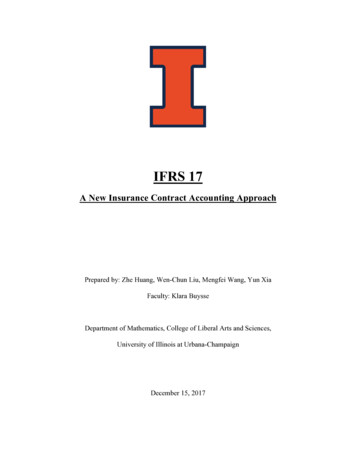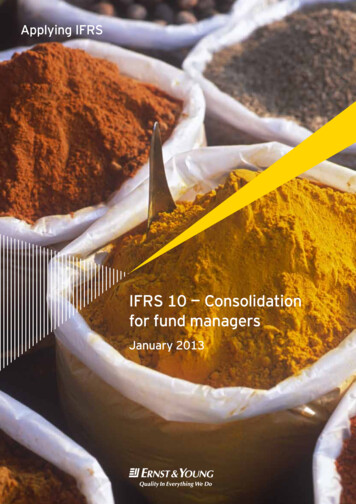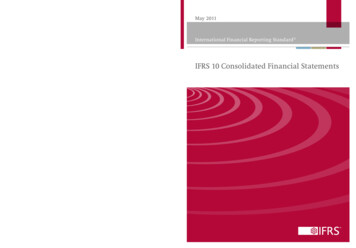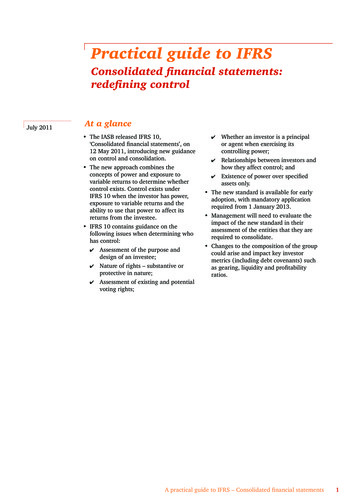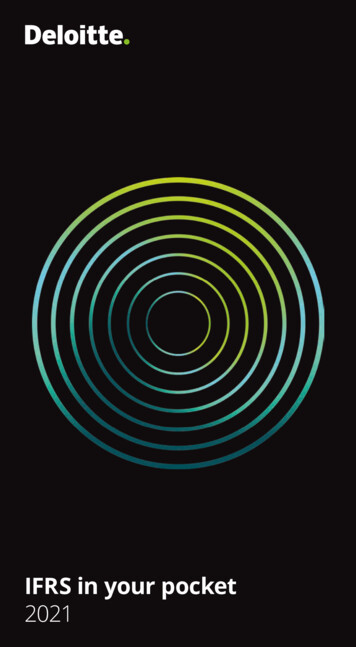
Transcription
IFRS in your pocket2021
ContentsAbbreviations1Foreword2Deloitte Accounting Research Tool (DART)4Our IAS Plus website6IFRS Standards around the world8The IFRS Foundation and the Board10Standards, Interpretations andPractice Statements20Board projects127Deloitte IFRS resources137Contacts139
IFRS in your pocket 2021AbbreviationsARCAccounting Regulatory CommitteeASAFAccounting Standards Advisory ForumDPDiscussion PaperECEuropean CommissionEDExposure DraftEFRAGEuropean Financial Reporting Advisory GroupGAAPGenerally Accepted Accounting PrinciplesIASInternational Accounting StandardIASB/BoardInternational Accounting Standards BoardIASC International Accounting Standards Committee(predecessor to the Board)IFRICInterpretation issued by the IFRS InterpretationsCommitteeIFRSInternational Financial Reporting StandardIFRS StandardsAll Standards and Interpretations issued by the Board(i.e. the set comprising every IFRS, IAS, IFRIC and SIC)PIRPost-implementation ReviewSECUS Securities and Exchange CommissionSICInterpretation issued by the Standing InterpretationsCommittee of the IASCSMEsSmall and Medium-sized EntitiesXBRLExtensible Business Reporting LanguageXMLExtensible Markup Language1
IFRS in your pocket 2021ForewordWelcome to the 2021 edition of IFRS in your pocket.IFRS in your pocket is a comprehensive summary of the current IFRSStandards and Interpretations along with details of the projectson the standard-setting agenda of the International AccountingStandards Board (Board). Backing this up is information about theBoard and an analysis of the use of IFRS Standards around theworld. This combination has made IFRS in your pocket an annual,and indispensable, worldwide favourite. It is the ideal guide, updateand refresher for everyone involved.In terms of new accounting requirements for annual periodsbeginning on or after 1 January 2021, it is a relatively quiet year,compared to recent years that saw the initial application ofIFRS 9, IFRS 15 and IFRS 16. Nonetheless, there are some importantchanges coming to financial instrument accounting with theadoption of Interest Rate Benchmark Reform—Phase 2 (Amendmentsto IFRS 9, IAS 39, IFRS 7, IFRS 4 and IFRS 16).Looking ahead, IFRS 17 Insurance Contracts is effective from1 January 2023.The Board will also be seeking input on several projects. InNovember 2020, the Board published a Discussion Paperto consult on Business Combinations under Common Control.Furthermore, the Board is seeking input on the postimplementation review of IFRS 10, IFRS 11 and IFRS 12. In January2021, ED/2021/1 Regulatory Assets and Regulatory Liabilities waspublished for public comment, proposing a new Standard on rateregulated activities that is intended to replace IFRS 14.In March 2021, the Board published a further ED under theDisclosure Initiative—Targeted Standards-level Review ofDisclosures and a Request for Information on the AgendaConsultation to help shape the five-year plan. At the time ofpublication the Board is also expected to consult on proposals fora reduced disclosure framework for subsidiaries that are small andmedium-sized entities, on Lack of Exchangeability (amendments toIAS 21) and on Management Commentary.With so much going on, the best way you can keep up to date onIFRS and broader corporate reporting developments is throughour website www.iasplus.com, which is widely regarded as themost comprehensive source of news and comment on this subject.2
IFRS in your pocket 2021In addition, the Deloitte Accounting Research Tool (DART) providesa comprehensive source of guidance on IFRS and beyond. Itincludes access to the full IFRS Standards, linking to and fromDeloitte’s authoritative, up-to-date, iGAAP manuals and modelfinancial statements.Veronica PooleGlobal IFRS Leader3
IFRS in your pocket 2021Deloitte Accounting ResearchTool (DART)The Deloitte Accounting Research Tool (DART) is a comprehensive onlinelibrary of accounting and financial disclosure literature.iGAAP on DART gives you quick access to: Deloitte’s authoritative, regularly updated, practical guidance on allIFRS Standards Illustrative and real life disclosure examples to help you navigaterecent changes in IFRS Standards Full text of IFRS Standards Practical issues faced by reporting entities Clear explanations of IFRS Standards requirements Interpretation and commentary when IFRS Standards are silent,ambiguous or unclear Model financial statements for IFRS reportersiGAAP deals comprehensively with IFRS Standards issued by the Boardand includes: iGAAP Volume A: A guide to IFRS reporting, which covers all IFRSStandards other than those dealing exclusively with financialinstruments iGAAP Volume B: Financial Instruments—IFRS 9 and relatedStandards, which provides guidance on the application of IFRSStandards dealing with financial instruments for entities that haveadopted, or are planning to adopt, IFRS 94
IFRS in your pocket 2021 iGAAP Volume C: Financial Instruments—IAS 39 and relatedStandards, which provides guidance on the application of IFRSStandards dealing with financial instruments for entities that have notyet adopted IFRS 9 IFRS disclosures in practice, which presents real-life examples of gooddisclosure practice under IFRS Standards from around the worldTo apply for a subscription to DART, click here to start the applicationprocess and select the iGAAP package.For more information about DART, including pricing of subscriptionpackages, click here.5
IFRS in your pocket 2021Our IAS Plus websiteDeloitte’s IAS Plus (www.iasplus.com) is one of the most comprehensivesources of global financial reporting news on the web. It is a centralrepository for information about IFRS Standards as well as the activitiesof the Board. The site, which is also available in German, includesportals tailored to the United Kingdom and Canada (available in Englishand French), each with a focus on local GAAP and jurisdiction-specificcorporate reporting requirements.IAS Plus features: News about global financial reporting developments, presentedintuitively with related news, publications, events and more, includinga resource page for accounting considerations in relation to COVID-19 Summaries of all Standards, Interpretations and projects, withcomplete histories of developments and standard-setter discussionstogether with related news and publications Rich jurisdiction-specific information, including background andfinancial reporting requirements, links to country-specific resources,related news and publications and a comprehensive history of theadoption of IFRS Standards around the world Detailed personalisation of the site, which is available by selectingparticular topics of interest and tailored views of the site Dedicated resource pages for research and education, sustainabilityand integrated reporting, accounting developments in Europe, globalfinancial crisis, XBRL and Islamic accounting Important dates highlighted throughout the site for upcomingmeetings, deadlines and more6
IFRS in your pocket 2021 A library of IFRS-related publications available for download andsubscription including our popular IFRS in Focus newsletters and otherpublications IFRS Model Financial Statements and Presentation and DisclosureChecklists, with many versions available tailored to specificjurisdictions An extensive electronic library of both global and jurisdiction-specificIFRS resources Expert analysis and commentary from Deloitte subject matterexperts, including webcasts, podcasts and interviews E-learning modules for most IFRS Standards Enhanced search functionality, allowing easy access to topics ofinterest by tags, categories or free text searches, with search resultsintuitively presented by category with further filtering options Deloitte comment letters to the Board and numerous other bodies A mobile-friendly interface and updates through RSS and Twitter7
IFRS in your pocket 2021IFRS Standards aroundthe worldMost jurisdictions have reporting requirements for listed and othertypes of entities that include presenting financial statements that areprepared in accordance with a set of generally accepted accountingprinciples. IFRS Standards are increasingly that prescribed set ofprinciples and are used extensively around the world.We maintain an up-to-date summary of the adoption of IFRS Standardsaround the world on IAS Plus at: s.The IFRS Foundation publishes individual jurisdictional profileswhich can be found in: on-profiles.aspx.Europe43 jurisdictions in Europe require IFRS Standards to be applied by allor most of their domestic publicly accountable entities. Switzerlandpermits the use of IFRS Standards.Europe has a strong endorsement process that requires eachnew Standard or Interpretation, or amendment to a Standard orInterpretation, to be endorsed for use in Europe. That process involves: Translating the Standards into all European languages The private-sector EFRAG giving its endorsement advice to the EC The EC’s ARC making an endorsement recommendation The EC submitting the endorsement proposal to the EuropeanParliament and to the Council of the EUBoth the parliament and the council must not oppose (or in certaincircumstances must approve) endorsement within three months,otherwise the proposal is sent back to the EC for further consideration.Further information on endorsement is available from europe. The mostrecent status on EU endorsement of IFRS Standards can be found at:www.efrag.org/Endorsement.After the end of the transition period on 31 December 2020, theUK ceased to apply EU law. IFRS Standards adopted by the EU atthat point of time were incorporated into domestic UK law as IFRSStandards as adopted by the UK. The Secretary of State for Business,Energy and Industrial Strategy (BEIS) now has the power of endorsingand adopting international accounting standards. These functionshave been delegated to a newly formed independent UK EndorsementBoard (UKEB).8
IFRS in your pocket 2021The Americas27 jurisdictions in the Americas require IFRS Standards to be appliedby all or most of their domestic publicly accountable entities. A further8 jurisdictions permit or require IFRS Standards for at least somedomestic publicly accountable entities.In the United States, foreign private issuers are permitted to submitfinancial statements prepared using IFRS Standards as issued by theBoard without having to include a reconciliation of the IFRS figures toUS GAAP. The SEC does not permit its domestic issuers to use IFRSStandards in preparing their financial statements; rather, they arerequired to use US GAAP.Asia-Oceania25 jurisdictions in Asia-Oceania require IFRS Standards to be appliedby all or most of their domestic publicly accountable entities. A further3 jurisdictions permit or require IFRS Standards for at least somedomestic publicly accountable entities.Africa36 jurisdictions in Africa require IFRS Standards to be applied by all ormost of their domestic publicly accountable entities and one permits orrequires IFRS Standards for at least some domestic publicly accountableentities.Middle East13 jurisdictions in the Middle East require IFRS Standards to be appliedby all or most of their domestic publicly accountable entities.Filing requirementsThe Board is also gathering information about the filing requirementsfor financial statements prepared in accordance with IFRS Standards.This includes an assessment of requirements to file electronic versionsof the financial statements, and the form of those filings.There is an increasing use of structured data filings using theXML-based language called XBRL. The SEC requires that foreign filerssubmit financial data in XBRL for annual periods ending on or after15 December 2017. Electronic filing requirements using XBRL and theIFRS Taxonomy have taken effect in Europe in 2020.The SEC and European electronic filings must use the IFRS Taxonomymaintained by the Board. More information is available atwww.ifrs.org/issued-standards/ifrs-taxonomy/.9
IFRS in your pocket 2021The IFRS Foundationand the BoardIFRS FoundationThe IFRS Foundation is the organisation that develops IFRS Standardsfor the public interest. It has a staff of around 150 people and has itsmain office in London and a smaller Asia-Oceania office in Tokyo.Within the Foundation is the Board, an independent body of accountingprofessionals that is responsible for the technical content of IFRSStandards. The staff of the Foundation support the work of theBoard. It has technical staff who analyse issues and help the Board(and its interpretations body—the IFRS Interpretations Committee)make technical decisions. Other staff provide support to adoptingjurisdictions, publications, education, communications (including thewebsite), investor relations, fundraising and administration.International Accounting Standards BoardThe Board is a technical standard-setting bodyMembershipThe Board has up to 14 members (currently 13).Most are full-time, so that they commit all of theirtime to paid employment as a Board member. Upto three can be part-time, but they are expected tospend most of their time on Board activities.All members of the Board are required to committhemselves formally to acting in the public interestin all matters.Global balanceFour members are appointed from each of AsiaOceania, Europe and the Americas and one memberfrom Africa.One additional member can be appointed from anyarea, subject to maintaining overall geographicalbalance.Qualificationsof Boardmembers10Members are selected to ensure that at all timesthe Board has the best available combination oftechnical expertise and diversity of internationalbusiness and market experience to develop highquality, global financial reporting standards.Members include people who have experience asauditors, preparers, users, academics and marketand/or financial regulators.
IFRS in your pocket 2021TermThe maximum term is 10 years—an initial term offive years and a second term of three to five years(five years for the Chair and Vice-Chair).MeetingsThe Board meets in public to discuss technicalmatters, usually each month except August.The current members of the Board are profiled at ards-board/#members.IFRS Interpretations CommitteeThe IFRS Interpretations Committee is responsible fordeveloping Interpretations of IFRS StandardsMembershipThe Committee has up to 14 members, appointedbecause of their experience with IFRS Standards.They are not paid, but the IFRS Foundationreimburses members for out-of-pocket costs.MeetingsThe Committee meets in public to consider requeststo interpret IFRS Standards. It meets every twomonths.InterpretationsIf the Committee decides that an IFRS Standard isnot clear and that it should provide an interpretationof the requirements it either develops anInterpretation or, in consultation with the Board,develops a narrow-scope amendment to the IFRSStandard.Deciding to develop an Interpretation, oramendment, means that the Committee has takenthe matter onto its agenda. The developmentof an Interpretation follows a similar processto the development of an IFRS Standard. Theyare developed in public meetings and the DraftInterpretation is exposed for public comment. Oncethe Interpretation has been completed it mustbe ratified by the Board before it can be issued.Interpretations become part of IFRS Standards, sohave the same weight as any Standard.11
IFRS in your pocket 2021AgendadecisionsAlong with its activity developing formalinterpretations of IFRS Standards and proposingthat the Board make amendments to Standards, theIFRS Interpretations Committee regularly publishessummaries of issues that it has decided not to addto its agenda, often accompanied by a discussion ofthe accounting issue submitted.In August 2020, The Trustees of the IFRS Foundationissued an updated IFRS Foundation Due ProcessHandbook establishing that the explanatory materialin the agenda decisions published by the IFRSInterpretations Committee derives its authority fromthe IFRS Standards themselves and, therefore, thatits application is required.The IFRS Foundation Due Process Handbook alsonotes that it is expected that an entity would beentitled to sufficient time to make that determinationand implement any necessary accounting policychange (for example, an entity may need to obtainnew information or adapt its systems to implementa change). Determining how much time is sufficientto make an accounting policy change is a matter ofjudgement that depends on an entity’s particularfacts and circumstances. Nonetheless, an entitywould be expected to implement any change ona timely basis and, if material, consider whetherdisclosure related to the change is required by IFRSStandards.12
IFRS in your pocket 2021Due processThe Board and its Interpretations Committee follow a comprehensiveand open due process built on the principles of transparency, full andfair consultation and accountability. The IFRS Foundation Trustees,through its Due Process Oversight Committee, is responsible foroverseeing all aspects of the due process procedures of the Boardand the IFRS Interpretations Committee, and for ensuring that thoseprocedures reflect best practice.In August 2020, the IFRS Foundation Trustees published an updatedDue Process Handbook. The due process requirements summarisedhere reflect the changes the Trustees made to the Handbook.TransparencyAll technical discussions are held in public (andusually via webcast) and the staff-prepared agendapapers are publicly available. The purpose of theagenda papers is to ensure that the Board andIFRS Interpretations Committee have sufficientinformation to be able to make decisions basedon the staff recommendations. A final Standard orInterpretation must be approved by at least8 members if the Board has 13 or less members or9 members if the Board has 14 members.13
IFRS in your pocket 2021Full and fairconsultationThe Board must: Hold a public consultation on its technical workprogramme every five years Evaluate all requests received for possibleinterpretation or amendment of a Standard Debate all potential standard-setting proposals inpublic meetings Expose for public comment any proposednew Standard, amendment to a Standard orInterpretation Explain its rationale for proposals in a basis forconclusions, and individual Board members whodisagree publish their alternative views Consider all comment letters received on theproposals, which are placed on the public record,in a timely manner Consider whether the proposals should beexposed again Consult ASAF and the Advisory Council on thetechnical work programme, major projects,project proposals and work priorities Ratify any Interpretations developed by the IFRSInterpretations Committee Decide whether it objects to an IFRSInterpretations Committee agenda decisionAdditionally, the Board must undertake the followingsteps, or explain why they do not consider them tobe necessary for a specific project: Publish a discussion document (for example, a DP)before specific proposals are developed Establish a consultative group or other types ofspecialist advisory group Hold public hearings Undertake fieldworkAccountabilityAn effects analysis and basis for conclusions (anddissenting views) are published with each newStandard.The Board is committed to conducting postimplementation reviews of each new Standard ormajor amendment of an existing Standard.14
IFRS in your pocket 2021Further information on the Board’s due process can be found ultative bodiesAdvisorygroupsThe IFRS Advisory Council meets twice a year. Itsmembers give advice to the Board on its workprogramme, inform the Board of their views onmajor standard-setting projects and give otheradvice to the Board or the Trustees. The AdvisoryCouncil has at least 30 members (and currently has48), including a member from Deloitte. Members areappointed by the Trustees and are organisations andindividuals with an interest in international financialreporting from a broad range of geographical andfunctional backgrounds.The Accounting Standards Advisory Forum (ASAF)meets with the Board four times a year, in a publicmeeting, to discuss technical topics. It comprises astandard-setter from Africa, three from each of theAmericas, Asia-Oceania and Europe and two fromany area of the world at large, subject to maintainingan overall geographical balance.StandingconsultativegroupsCapital Markets Advisory Committee (users), GlobalPreparers Forum (preparers), Emerging EconomiesGroup, Islamic Finance Consultative Group, IFRSTaxonomy Consultative Group, SME ImplementationGroup, World Standard-setters Conference.TransitionResourceGroups (TRGs)Created for specific new Standards—there iscurrently only one active TRG for InsuranceContracts.ProjectconsultativegroupsRate Regulation, Management Commentary15
IFRS in your pocket 2021IFRS Foundation (and Board)7 Westferry Circus, Canary Wharf, London E14 4HD, UKTelephone: 44 (0) 20 7246 6410General e-mail: info@ifrs.orgWebsite: www.ifrs.orgAsia-Oceania officeOtemachi Financial City - South Tower, 5F, 1-9-7, Otemachi,Chiyoda-ku, Tokyo, 100-0004, JapanTelephone: 81 (0) 3 5205 7281Fax: 81 (0) 3 5205 7287General e-mail: AsiaOceania@ifrs.org16
IFRS in your pocket 2021GovernanceMonitoring BoardOversees theTrustees andprovides a formal linkbetween the Trusteesand public authoritiesIFRSAdvisorycouncilA soundingboard forthe Boardand theTrusteesTrustees of theIFRS FoundationResponsible forthe governance andoversight of the BoardBoardResponsible fordeveloping andapproving allStandards andInterpretationsAdvisesReports toIFRS InterpretationsCommitteeConsiders requeststo interpret how IFRSStandards should beapplied – can developInterpretations orminor amendmentsfor the BoardASAFProvides technicalsupport and adviceto the BoardProjectConsultative GroupsProvide advice on majorprojects to develop anew StandardStandingConsultative GroupsProvide advice froma particular sector oron a special topicTransitionResource GroupsProvide transitionsupport for major newStandards17
IFRS in your pocket 2021Monitoring BoardThe Monitoring Board provides formal interaction between capitalmarkets authorities and the IFRS Foundation. It provides publicaccountability of the IFRS Foundation through a formal reporting linefrom the Trustees of the Foundation to the Monitoring Board.Responsibilities Approves the appointment of the Trustees Reviews the adequacy and appropriateness ofTrustee arrangements for financing the Board Reviews the Trustees’ oversight of the Board’sstandard-setting process, particularly withrespect to its due process arrangements Confers with the Trustees regarding theresponsibilities pertinent to the IFRS Foundation’soversight to the Board, particularly in relation tothe regulatory, legal and policy developments Can refer matters of broad public interest relatedto financial reporting to the Board through theIFRS FoundationMembership18The Monitoring Board currently comprisesrepresentatives of the International Organization ofSecurities Commissions (IOSCO), the IOSCO Growthand Emerging Markets Committee, the EuropeanCommission (EC), Financial Services Agency of Japan(JFSA), US Securities and Exchange Commission(SEC), Brazilian Securities Commission (CVM),Financial Services Commission of Korea (FSC) andthe Ministry of Finance of the People’s Republic ofChina. There are also non-voting observers from theBasel Committee on Banking Supervision, the IOSCOAfrica and Middle-East Regional Committee and theIOSCO Growth and Emerging Markets Committee.
IFRS in your pocket 2021Trustees of the IFRS FoundationThe Foundation’s governing body is the Trustees of the IFRS Foundation.Responsibilities Appoint members of the Board, the IFRSInterpretations Committee and the IFRS AdvisoryCouncil Establish and amend the operating procedures,consultative arrangements and due process forthe Board, the Interpretations Committee and theAdvisory Council Review annually the strategy of the Board andassess its effectiveness Ensure the financing of the IFRS Foundation andapprove its budget annuallyThe Trustees ensure that the Board develops IFRSStandards in accordance with its due processrequirements, through the Trustee Due ProcessOversight Committee.MembershipThere are 22 Trustees, each being appointed for athree-year term, renewable once. The exception isthat a trustee can be appointed to serve as Chair orVice-Chair for a term of three years, renewable once,provided that the total period of service does notexceed nine years.Trustees are selected to provide a balance of peoplefrom senior professional backgrounds who have aninterest in promoting and maintaining transparencyin corporate reporting globally. To maintain ageographical balance, six trustees are appointedfrom each of Asia-Oceania, Europe and theAmericas, one Trustee is appointed from Africa andthree Trustees are appointed from any area, subjectto maintaining the overall geographical balance.19
IFRS in your pocket 2021Standards, Interpretations andPractice StatementsThe Board was established in 2001, replacing the IASC. The IASCproduced Standards called International Accounting Standards (IASStandards) and its Interpretations were called SIC Interpretations.One of the first actions of the Board was to adopt all of the IASC’s IASStandards and SIC Interpretations as its own. At the same time, theBoard started to develop new Standards and Interpretations, callingeach new Standard an IFRS Standard and each Interpretation an IFRICInterpretation.IFRS 1 First-time Adoption of International FinancialReporting Standards defines IFRS as all of the Standards andInterpretations adopted or issued by the IASB (IASs, IFRSs,SICs and IFRICs). The Board refers to the collective set as IFRSStandards. All of the individual requirements have equalauthority.Transition overlapWhen the Board amends or issues new Standards it provides a periodof transition before the new requirements are mandatory, but generallyallows entities to apply the new requirements before the mandatorydate. The effect is that there is sometimes a choice of requirementsavailable to entities. For example, an entity could continue to applyIFRS 4 Insurance Contracts in periods beginning 1 January 2021 or itcould elect to apply IFRS 17 Insurance Contracts.The Board produces two volumes of Standards and Interpretations –the Blue and Red Books.Blue Book20The Standards and Interpretations that an entitywould apply if it elected not to apply any newrequirements before the mandatory date. Thisvolume does not include the versions of Standardsor Interpretations that have an effective date after1 January of that year. For example, the 2021 volumeincludes IFRS 4 Insurance Contracts, but not IFRS 17Insurance Contracts.
IFRS in your pocket 2021Red BookThe Standards and Interpretations that anentity would apply if they applied all of the newrequirements earlier than required. This volumedoes not include the versions of Standards orInterpretations that those new requirements arereplacing. For example, the 2021 volume includesIFRS 17 Insurance Contracts, but not IFRS 4 InsuranceContracts.The Board also produces annotated versions of these volumes thatreproduce the agenda decisions issued by the IFRS InterpretationsCommittee and cross-references to the basis for conclusions andrelated Standards or Interpretations.Unaccompanied Standards and Interpretations are available on theIFRS Foundation website: www.ifrs.org/issued-standards/list-ofstandards/. The versions are a mixture of extracts from the Blue andRed Books and are updated at the beginning of each calendar year.The non-mandatory implementation and illustrative guidanceand bases for conclusions that accompany the Standards andInterpretations are not freely available. IASB pronouncements andpublications can be purchased in printed and electronic formatsfrom the IFRS Foundation.IFRS Foundation Publications department orders and enquiries:Telephone: 44 (0) 20 7332 2730 Fax: 44 (0) 20 7332 2749Website: shop.ifrs.org e-mail: publications@ifrs.org21
IFRS in your pocket 2021In the sections that follow, we have summarised the requirementsof the Standards and Interpretations on issue at 1 April 2021. Thesesummaries are intended as general information and are not a substitutefor reading the entire Standard or Interpretation.Preface to International Financial Reporting StandardsCovers, among other things, the objectives of the Board, the scopeof IFRS Standards, due process for developing Standards andInterpretations, equal status of ‘bold type’ and ‘plain type’ paragraphs,policy on effective dates and use of English as the official language.Conceptual Framework for Financial ReportingOverviewDescribes the objective of, and the concepts for,general purpose financial reporting.Purpose andstatusAssists the Board to develop Standards that are basedon consistent concepts; preparers to develop consistentaccounting policies when no Standard applies toa particular transaction or other event, or when aStandard allows a choice of accounting policy; and allparties to understand and interpret the Standards.It is not a Standard and sits outside of IFRSStandards. Nothing in the Framework overrides anyStandard or any requirement in a Standard.The Objectiveof GeneralPurposeFinancialReportingThe objective of general purpose financial reportingis to provide financial information about the reportingentity that is useful to existing and potential investors,lenders and other creditors in making decisionsrelating to providing resources to the entity.Those decisions include buying, selling or holdingequity and debt instruments, providing
3 jurisdictions permit or require IFRS Standards for at least some domestic publicly accountable entities. Africa 36 jurisdictions in Africa require IFRS Standards to be applied by all or most of their domestic publicly accountable entities and one permits or requires IFRS Standards
